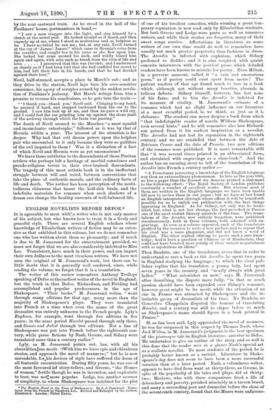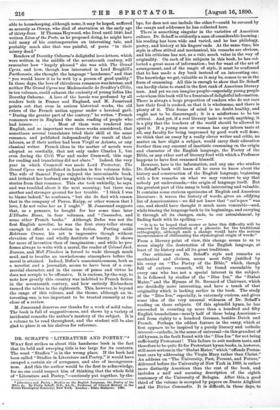ENGLISH NOVELISTS BEFORE DEFOE.*
IT is agreeable to meet with:a writer who is not only master of his subject, but who knows how to treat it in a lively and graceful style. There are several English scholars whose knowledge of Elizabethan writers of fiction may be as exten- sive as that exhibited in this volume, but we do not remember one who has written about them so pleasantly; and if much is due to M. Jusserand for the entertainment provided, we must not forget that we are also considerably indebted to Miss Lee. Translators have much in their power, and can impart their own dullness to the most vivacious writers. We have not seen the original of M. Jusserand's work, but there can be little doubt that it is generally well rendered, since, while reading the volume, we forget that it is a translation.
The writer of this review remembers Anthony Trollope speaking of Defoe as the:earliest writer of the novel in England; but the truth is, that Defoe, Richardson, and Fielding had accomplished and popular predecessors. in the age of Shakespeare. " Their books," M. Jusserand writes, " went through many editions for that age, many more than the majority of Shakespeare's plays. They were ' translated into French at a time when even the name of the great dramatist was entirely unknown to the French people. Lyly's Ewphues, for example, went through five editions in five years ; in the same period Hamlet passed through only three, and Romeo and Juliet through two editions. Not a line of Shakespeare was put into French before the eighteenth cen- tury, while prose fictions by Nash, Greene, and Sidney were translated more than a century earlier."
Lyly, as M. Jusserand points out, has, with all his absurdities,lone merit: "IWith him we leave epic and chivalrous stories, and approach the novel of manners ;" but he is now unreadable, for-his devices of style have suffered the doom of all fantastic eccentricities. During fifty years, he was one of the most favoured [of story-tellers, and Greene, " the Homer of women," fertile though he was in invention; and euphuistic to boot, was not; more popular. Lodge, too, another scorner of simplicity, to whom Shakespeare was indebted for the plot • The English Novel in the Time ef Shakespeare. By J. J. Jueserand. Trans- lated from the French by Elizabeth Lee. Revised and Enlarged by the Author. Illustrated. London: Fisher thiwin.
of one of his loveliest comedies, while winning a great tem- porary reputation, is now read only by Elizabethan students.
But both Greene and Lodge were poets as well as romance- writers, and while their stories are forgotten, many of their sweet songs survive. Affectations in literature, as some writers of our own time would do well to remember, have usually not much greater perpetuity than fashions in dress.
The Arcadia is infected with euphuism, which Sidney professed to dislike ; and it is also weighted with quaint conceits interwoven with the poetical prose which deluded readers have been known to mistake for poetry. Even Milton,. in a perverse moment, called it " a vain and amatorious poem," as if poetry could exist apart from metre ! The patient readers of that age found much to love in a book which, although not without many beauties, abounds in tedious defects. Sidney himself, however, has lost none
of his fame, and to him the Arcadia is indebted for its measure of vitality. M. Jusserand's estimate of a
romance which had no slight influence on our literature at a most eventful period, is, we think, as just as it is elaborate. The student can never despise a book from which "that indefatigable reader of novels, William Shakespeare, took several hints," and he will remember also how Richard- son gained from it his earliest inspiration as a novelist. The Arcadia had not lost its reputation in the eighteenth century, and we are reminded that between the date of Robinson Crusoe and the date of Pamela, two new editions of the romance were published. It is more remarkable still that " it was several times printed in an abbreviated form,. and circulated with engravings as a class-book." And the author has an amusing story to tell of the translation of the Arcadia into French a century earlier :-
" A Frenchman possessing a knowledge of the English language was then an extraordinary phenomenon. As late as the year 1665, no less a paper than the Journal des Scavans printed a statement to the following effect : The Royal Society of London publishes constantly a number of excellent works. But whereas most of them are written in the English language, we have been unable till now to review them in our pages ; but we have at last found an English interpreter, through whose offices it will be henceforth possible for us to enrich our publication with the best things appearing in England.' As for Sidney, not only was he trans- lated, but, what is not less strange, the fact provoked in France one of the most violent literary quarrels of the time. Two trans- lations of the Arcadia, now entirely forgotten, were published simultaneously, both in three volumes, both adorned with en- gravings. As soon as a volume appeared, each of the translators profited by the occasion to write a new preface, and to repeat that his rival was a more plagiarist, and did not know a word of English. The other replied offering to prove such a rare know- ledge ; had it been a question of Chinese or of Hindustani, they could not have boasted more noisily of their unique acquaintance with so mysterious an idiom."
Then Baudoin, one of the translators, avers that in order to- understand so rare a book as tl.r Arcadia, he spent two years in England studying the language ; to which the rival pub-
lisher replies that his translator, a young lady, had spent seven years in the country, and " nearly always with great ladies." " What astonishes us now," says M. Jusserand. after describing the dispute more fully, "is that so much
passion should have been expended over Sidney's romance, however great might be its merit, while the attention of no- one in France was attracted by Shakespeare and the in-
imitable group of dramatists of his time. No Baudoin, no Genevieve Chappelain disputed the honour of translating Hamlet, and a century was still to elapse before so much as Shakespeare's name should figure in a book printed in
France."
If, as has been said, Lyly approached the novel of manners, he was far surpassed in this respect by Thomas Nash, whose Jack Wilton, in M. Jusserand's judgment, is the best specimen.
of the picaresque tale in English literature anterior to Defoe. He undertakes to give an outline of the story, and so well is this done that the reader sees at a glance Nash's special art
as a realistic novelist. To most students of the period, he is probably better known as a satirist. Literature in Shake- speare's day does not seem to have been a more successful vocation than at a later period. Nash, a voluminous writer,
appears to have died from want at thirty-three, as Greene, in spite of the popularity of his tales and plays, did at thirty-
two; Marlowe, who with these companions lived a life of debauchery and poverty, perished miserably in a tavern brawl, and many a succeeding poet and dramatist before the close of the seventeenth century, found that the Muses were unfavour-
able to housekeeping, although none, it may be hoped, suffered so severely as Otway, who died of starvation at the early age of thirty-four. If Thomas Heywood, who lived until 1640, had written Lives of the Poets, as he proposed doing, he might have told many of his contemporaries an interesting tale, and probably much also that was painful, of poets "in their misery dead."
Readers of Dorothy Osborne's delightful love-letters, which were written in the middle of the seventeenth century, will remember how "hugely pleased" she was with The Grand Cyrus, and how, though less interested in Lord Broghill's Parthenesia, she thought the language " handsome," and that " you would know it to be writ by a person of good quality." In those days, the love of chivalrous romances was intense, and neither The Grand Cyrus nor Mademoiselle de Scudery's
in ten volumes, could exhaust the curiosity of young ladies like Dorothy Osborne. A love of the heroic was professed by all readers both in France and England, and M. Jusserand points out that even in serious historical works, the old rulers of the French nation appear under a heroical garb. " During the greater part of the century," he writes, " French romances were in England the main reading of people who
had leisure Most of them were rendered into English, and so important were these works considered, that sometimes several translators tried their skill at the same romance, and published independently the result of their labours, as if their author had been Virgil or Ariosto, or any classical writer. French ideas in the matter of novels were adopted so cordially, that not only under Charles I., but even during the Civil War and under Cromwell, this rage for reading and translating did not abate." Indeed, the very year in which Cromwell was made Lord Protector, The Grand Cyrus was published in London in five volumes folio. The wife of Samuel Pepys enjoyed the interminable book, and irritated her husband one night in the coach with her long stories from that romance. This she took unkindly, he says, and was troubled about it the next morning; but there was another and stronger ground for her trouble. " I think I was to blame indeed," he confesses, " but she do find with reason that in the company of Pierce, Knipp, or other women that I love, I do not value her as I ought." M. Jusserand suggests that, as a penance, he bought for her some time later _L'Illustre Bassa, in four volumes, and " Cassandra, and some other French books." Although Defoe was not the first English novelist, he was the first story-teller strong enough to effect a revolution in fiction. Putting aside Robinson Crusoe, his art is impressive though without elevation of tone and wholly destitute of beauty. It shows far more of invention than of imagination ; and while he pro- fesses always to write with a moral, the reader of Colonel Jack, Rozano, and Moll Flanders is forced to wade through much mud, and to breathe an unwholesome atmosphere before the moral is attained. Indeed, Defoe's conscientiousness, both as a. novelist and a journalist, seems to have been of a com- mercial character, and in the cause of pence and virtue he does not scruple to be offensive. It is curious, by-the-way, to note how greatly this country was indebted to French fiction in the seventeenth century, and how entirely Richardson turned the tables in the eighteenth. This, however, is beyond the range of this volume, and the theme, although an in- teresting one, is too important to be treated cursorily at the close of a review.
M. Jusserand deserves our thanks for a work of solid value. The book is full of suggestiveness, and shows by a variety of incidental remarks the author's mastery of the subject. It is a. volume to be read throughout, and the student will be also glad to place it on his shelves for reference.



































 Previous page
Previous page